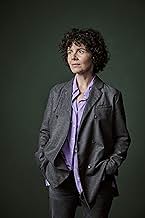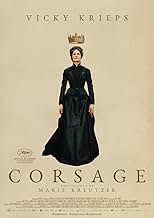ÉVALUATION IMDb
6,5/10
11 k
MA NOTE
L'impératrice Elisabeth d'Autriche est idolâtrée pour sa beauté et réputée pour ses tendances mode inspirantes. En 1877, elle est considérée comme une vieille femme, elle commence donc à ess... Tout lireL'impératrice Elisabeth d'Autriche est idolâtrée pour sa beauté et réputée pour ses tendances mode inspirantes. En 1877, elle est considérée comme une vieille femme, elle commence donc à essayer de maintenir son image publique.L'impératrice Elisabeth d'Autriche est idolâtrée pour sa beauté et réputée pour ses tendances mode inspirantes. En 1877, elle est considérée comme une vieille femme, elle commence donc à essayer de maintenir son image publique.
- Nominé pour le prix 1 BAFTA Award
- 17 victoires et 43 nominations au total
Sommaire
Reviewers say 'Corsage' delves into Empress Elisabeth of Austria's conflict with societal norms and personal autonomy, emphasizing beauty, power, and gender limitations. Vicky Krieps' performance is lauded for its depth and complexity. However, the film faces criticism for its sluggish tempo, historical inaccuracies, and disjointed storyline. Some find the anachronistic aspects and historical deviations distracting. Despite these drawbacks, the film's cinematography, costume design, and Krieps' captivating performance are often noted as significant strengths.
Avis en vedette
A beautifully shot and elegiac film that explores the life of Empress Elisabeth of Austria as she navigates the expectations of her culture and her own desires. Vicky Krieps gives a layered and nuanced performance as Elisabeth, and the metaphor of the corset effectively symbolizes the constrictions of her privileged but powerless life. While the film is unabashedly fictionalized, it effectively captures the internal struggles of a woman who is constantly told what to do and who grapples with the fear of losing her beauty and power as she ages. The sumptuous settings and contemporary songs add to the overall atmosphere of the film, which is both poignant and thought-provoking. Overall, "Corsage" is a worthwhile watch for fans of historical dramas and those interested in exploring themes of beauty, power, and the constraints of societal expectations.
Vicky Krieps just might be the biggest name in European cinema right now: 2021 alone saw her star in six productions, under direction of everyone: from M. Night Shyamalan in Anormal (2021) to Mia Hansen-Løve in Bergman Island (2021) and Mathieu Amalric in Serre moi fort (2021). Her performances have been consistently critically acclaimed, as is bound to be the case with Corsage.
Focussing on one year - 1878, we are reminded throughout the film - Corsage sets out to tell the story of Empress Elisabeth of Austria (1837-1898), known as Sissi, although the movie has no use for that nickname. The picture, written and directed by Austrian film-maker Marie Kreutzer, liberally blends fact and fiction: when asked how much of her work was faithful to history, Kreutzer said in an interview that she could not remember exactly. There are elements to the narrative (such as the ending) that are obvious inventions, while the rest is an amalgamation. The result is credible until it isn't; the background images being most at fault - who knew that electric floor lamps were so popular in the Kingdom of Bavaria. (Comparatively, the intentionally anachronistic music choices, like 'As Tears Go By' played on the harp, succeed in appearing an intrinsic part of the narrative.)
Corsage is very much a story of a person who sees herself as trapped while, possibly, enjoying the most freedom out of everyone we encounter. The visits Elizabeth pays to a psychiatric asylum and to see wounded, bed-ridden soldiers strike as performative, but the choice of her compassionate causes seems rooted in identifying her circumstances with theirs. Why, the empress cannot leave her position either - or can she?
Corsage is very successful in its depiction of a complex, not entirely sympathetic person. It is quite careless about the tools used to achieve that goal - yet, if you watch the film to its very last bit, the end credits include a scene of Vicky Krieps dancing in an empty gymnasium (the flaking paint is supposed to symbolise the decay of the monarchy). She is mesmerising. She is also wearing a false moustache, as a final reminder from Corsage to not take the production too literally.
Focussing on one year - 1878, we are reminded throughout the film - Corsage sets out to tell the story of Empress Elisabeth of Austria (1837-1898), known as Sissi, although the movie has no use for that nickname. The picture, written and directed by Austrian film-maker Marie Kreutzer, liberally blends fact and fiction: when asked how much of her work was faithful to history, Kreutzer said in an interview that she could not remember exactly. There are elements to the narrative (such as the ending) that are obvious inventions, while the rest is an amalgamation. The result is credible until it isn't; the background images being most at fault - who knew that electric floor lamps were so popular in the Kingdom of Bavaria. (Comparatively, the intentionally anachronistic music choices, like 'As Tears Go By' played on the harp, succeed in appearing an intrinsic part of the narrative.)
Corsage is very much a story of a person who sees herself as trapped while, possibly, enjoying the most freedom out of everyone we encounter. The visits Elizabeth pays to a psychiatric asylum and to see wounded, bed-ridden soldiers strike as performative, but the choice of her compassionate causes seems rooted in identifying her circumstances with theirs. Why, the empress cannot leave her position either - or can she?
Corsage is very successful in its depiction of a complex, not entirely sympathetic person. It is quite careless about the tools used to achieve that goal - yet, if you watch the film to its very last bit, the end credits include a scene of Vicky Krieps dancing in an empty gymnasium (the flaking paint is supposed to symbolise the decay of the monarchy). She is mesmerising. She is also wearing a false moustache, as a final reminder from Corsage to not take the production too literally.
The danger with fictional accounts of the lives of real people, is that it is frequently all to easy to poke holes in the plot. This is one such film that takes just a little too much creative licence with the the life of the Empress Elisabeth (Vicky Krieps). Wife of the famed Austro-Hungarian Emperor Franz Josef (Florian Teichtmeister), this film follows a supposed year in the life of this curious historical figure who, having suffered a family tragedy and having a rather estranged emotional relationship with her husband, spends much of her life obsessing with her weight and seeking solitude. Krieps is on good form, she creates a persona for her character that is effective to watch, but the mixture of modern and period scenarios (old buildings with modern fire doors; a cross-channel ferry!) seems anachronistic - to what end? The buildings in which she and her family inhabit have none of the opulence and grandeur of the Hofburg or Prague Castle, indeed the British home of her horse-master "Bay" (Colin Morgan) looks little better that a ramshackle ruin - and this is incongruous with the way we know she lived her life. Reclusive, yes, but still in splendour. It is also a particularly unremarkable year in her life to have chosen to illustrate. Not the previous ones where turbulence within the Imperial family reigned, not the famed "Mayerling" period which was ultimately held responsible for the final decline of this lady. There is also an highly speculative portrayal of her relationship with Bavaria's equally famous King Ludwig II (Manuel Rubey). The denouement itself is presented here in a rather too bizarre fashion that rather topped off this interesting but frankly flat and pace-less drama that offers us a glimpse of this intriguing woman, but little more of substance. Pity.
Life begins at forty, or so they say, so much living to enjoy from that big day, you can starve yourself to death, injecting drugs, to reduce stress, seduce your cousin, to find he doesn't want to play. As an Empress, you have everything you want, the world outside wants to see what you have to flaunt, but you like to use a double, can't be bothered with the trouble, and you've cut your hair, to ridicule and taunt. It's been observed, that you've become, a little vain, look for compliments, to take away the pain, your husband's disengaged, you often cause him some outrage, you have disdain that you suck in, and then constrain.
Great performance from the wonderful Vicky Krieps but if you're not a huge fan of the character or the era you may find it a little less engaging than you might like.
Great performance from the wonderful Vicky Krieps but if you're not a huge fan of the character or the era you may find it a little less engaging than you might like.
This film was beautifully shot and I enjoyed the aesthetics. The lead actress was entertaining, and sometimes spellbinding. But that's about it.
It can't even be described as a 'slow burn' as that usually includes some ups and downs, but this really didn't. It was such a steady storytelling that I never felt any highs or lows.
I was very confused as this was supposed to be 19th century but had elements of 20th century. That distracted me as I didn't get a sense of place or time to try and plug into the story.
Overall a film that will probably appeal to those more intelligent/informed/interested than I am.
It can't even be described as a 'slow burn' as that usually includes some ups and downs, but this really didn't. It was such a steady storytelling that I never felt any highs or lows.
I was very confused as this was supposed to be 19th century but had elements of 20th century. That distracted me as I didn't get a sense of place or time to try and plug into the story.
Overall a film that will probably appeal to those more intelligent/informed/interested than I am.
Le saviez-vous
- AnecdotesThe real Empress Elisabeth Of Austria refused all portraits or photographs after the age of 40 to maintain her youthful public image.
- GaffesFranz Joseph I of Austria never blamed his wife, the Empress Elisabeth of Austria, for the death of Archduchess Sophie of Austria. The criticism of Elisabeth's parenting came from her mother-in-law, Princess Sophie of Bavaria.
Meilleurs choix
Connectez-vous pour évaluer et surveiller les recommandations personnalisées
- How long is Corsage?Propulsé par Alexa
Détails
- Date de sortie
- Pays d’origine
- Sites officiels
- Langues
- Aussi connu sous le nom de
- Corsage. La emperatriz rebelde
- Lieux de tournage
- sociétés de production
- Consultez plus de crédits d'entreprise sur IMDbPro
Box-office
- Budget
- 7 500 000 € (estimation)
- Brut – États-Unis et Canada
- 705 767 $ US
- Fin de semaine d'ouverture – États-Unis et Canada
- 32 285 $ US
- 25 déc. 2022
- Brut – à l'échelle mondiale
- 3 110 623 $ US
- Durée
- 1h 54m(114 min)
- Couleur
- Rapport de forme
- 2.39 : 1
Contribuer à cette page
Suggérer une modification ou ajouter du contenu manquant



































